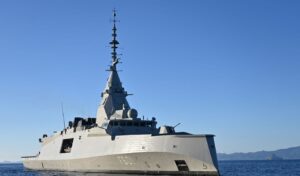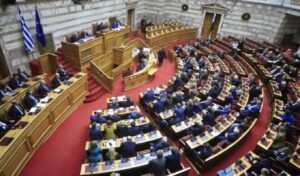On Wednesday morning, the leadership of SYRIZA and New Left as well as the top officials of both parties demonstrated together in central Athens, at the trade union strike rally. If someone wasn’t initiated into the inner workings of the left geography, they would be certain that these are officials under the same party roof. For years, perhaps even decades, they were in the same political space or even in the same intra-party factions.
The situation, however, is far from rosy for the relations between the two parties and, much more so, for the prospect of reconnection. The facts are as follows. In the recent period and prompted by the OPEKEPE scandal, the two parties came quite close. They co-signed a joint request for the establishment of a Preliminary Investigation Committee, while on other issues concerning parliamentary control they had a common stance, resulting in most people anticipating the possibility of merging the two parliamentary groups, with the ultimate goal of pre-election cooperation.
It helped that Socrates Famellos and Alexis Charitsis have an excellent personal relationship, while the role of top officials who maintain open communication channels is also significant, such as Olga Gerovasili, Efi Achtsioglou and others. And this, despite the fact that in both parties there are voices that react – indeed, within New Left these voices are in the majority.
The most optimistic in both parties believe that, despite the apparent difficulties, efforts for understanding should not be abandoned. The most progressive believe that this should happen even in view of Alexis Tsipras’ initiatives
The frigate that divided SYRIZA and New Left
The events, however, or rather, the political positions are… stubborn. What happened? Socrates Famellos’ personal decision to have SYRIZA vote in favor of purchasing the fourth frigate created a major crisis in the relations between the two parties. For Charitsis’ party, defense equipment and extraction issues are central and decisively influence alliances. And the truth is that the New Left president was also expecting a “programmatic signal” from SYRIZA’s side in order to have weapons in his quiver to convince his officials who are categorically opposed to cooperation. As we mentioned earlier, we’re talking about the majority of New Left officials, with the most characteristic cases being Euclid Tsakalotos, Sia Anagnostopoulou, Gabriel Sakellaridis, Peti Perka, Nikos Filis, Panos Skourletis, Kostas Poulakis and others.
Information indicates that Charitsis was disappointed by Famellos’ stance, resulting in a freeze within the circles of both parties. What’s interesting is that the SYRIZA president probably made the decision alone, given that central party officials, such as Foreign Affairs sector head Rena Dourou, secretary Stergios Kalpakis, press spokesman Kostas Zachariadis, former secretary Rania Svigkou, Thanasis Theocharopoulos and others, disagreed with the choice to vote for purchasing the fourth frigate.
Nevertheless, the most optimistic in both parties believe that, despite the apparent difficulties, efforts for understanding should not be abandoned. The most progressive believe that this should happen even in view of Alexis Tsipras’ initiatives, in order to have stronger negotiating power if there is any initiative for understanding with the former prime minister.
Confusion in SYRIZA
In any case, things are more complicated for SYRIZA, in the sense that great confusion prevails regarding the possibility of creating a party, which information places in the first quarter of 2026. Before that, however, resignation from the parliamentary office will come first, which will not happen before the publication of Tsipras’ book. The former prime minister, according to his associates, is writing the book’s epilogue, which is expected in bookstore shelves at the end of November. “Final decisions will be made at Christmas,” is the clear message they send, refuting unfounded rumors that circulated regarding the acceleration of the former prime minister’s moves.
However, the recent sessions of party organs were far from calm. Officials from the Polakis-Pappas climate now publicly position themselves against Tsipras, preparing the ground for confrontation, while, according to many, they are showing the former prime minister the exit door in their own way. Naturally, Famellos finds it far from easy to manage this situation, while it’s a matter of time before MPs and officials who are very close to Tsipras take a hard stance. We refer to Katerina Notopoulou, Giorgos Karameros, Charis Mamoulakis, Symeon Kedikoglou and, of course, Olga Gerovasili, who is Tsipras’ closest associate and watches every word she uses to avoid any misinterpretation.
In conclusion, we would say that the landscape “to the left of PASOK” is completely uncharted. By common admission, everything depends on Alexis Tsipras and everything is awaiting his decisions. Unless Nikos Androulakis were to immediately take some bold initiative toward the leaderships of SYRIZA and New Left…
Published in Parapolitika




